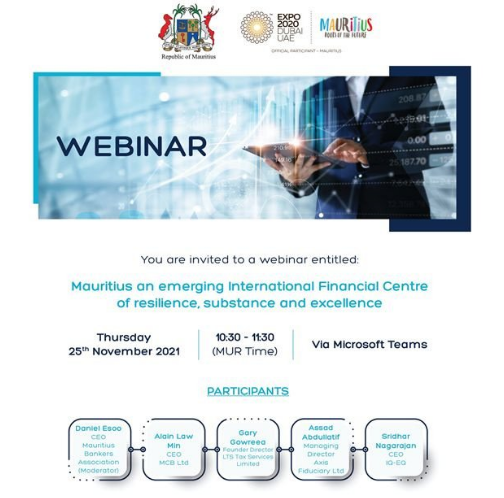While COVID-19 and its economic impact still pose challenges, Mauritius has learnt a lot over the past 18 months that has helped the jurisdiction evolve into a more equitable, sustainable, and resilient IFC.
Delving deeper into this during a webinar entitled “Mauritius, an emerging International Financial Centre of resilience, substance and excellence” hosted by the Economic Development Board (EDB) on 25 November, the webinar’s moderator Daniel Essoo, CEO of the Mauritius Bankers Association (MBA), touched upon what is new in Mauritius post-Covid, what the jurisdiction has to offer, challenges and opportunities, FinTech potential, sustainable finance growth and more.
Sharing insights were panelists Alain Law Min – CEO, MCB Ltd; Gary Gowrea – Founder Director, LTS Tax Services Limited; Assad Abdullatif – Managing Director, Axis Fiduciary Ltd; and Sridhar Nagarajan – Regional Managing Director, IQ-EQ.

Systemic resilience in dealing with COVID-19
Recounting how Mauritius has responded and proved itself over the past 18 months, Alain recalled that despite two lockdowns, frontiers being closed until recently, being put on the FATF’s greylist and the EU’s list of high-risk third countries, and the Moody’s ratings downgrade - Mauritius has made it through and has been very resilient.
This is largely due to the Government’s initiative of introducing the Self-Employed Assistance Scheme and Wage Assistance Scheme. Alain explained, “On top of that, banks have remained strongly capitalised and very liquid. Technology has been a big enabler. Business has not been disrupted due to systems that were put in place with Work-from-Home. The exit from the FATF has been great news for the financial sector.”
Global business major IQ-EQ works predominantly with clients who are not in Mauritius, where Sridhar feels the crisis has ‘released efficiency’ and the firm has grown 7-8% on the funds side. He says, “The commuting time of our administrators has been ploughed back into time with clients. As investor services, our product is knowledge and time, so for us the pandemic has been a total discovery. Most of our peers have adapted and even leveraged it to suit the new generation of millennials or digitals who are joining us.”
To recap, Mauritius was removed from the FATF’s greylist on 26 October and, with the support of industry stakeholders, the jurisdiction was also removed from the UK’s AML/CFT blacklist. This should pave the way to come out of the EU list as well. Assad added, “We need to make sure we remain on the whitelist. We had a framework for money laundering and terrorist financing and that framework has been regularly updated. Today, other jurisdictions probably envy us because we have a top-notch AML/CFT framework.”
The global tax scenario, exemptions available
Giving an overview of the global tax scene, Gary thought it was great that Mauritius has never been on any tax blacklist. On 8 October, the G20 endorsed the OECD’s work on digitalisation, whereby they adopted a two-pillar approach to ensure fair collection of taxes globally.
Pillar One action points concern redistribution of the tax rights to other countries where clients/market segments are located, which Gary considered would not affect Mauritius. However, Pillar Two is of relevance to Mauritius where the interest of global minimum tax of 15% comes into place. The tax rate of 15% in Mauritius is fine on the face of it, but Gary explains, “We have certain exemptions available that bring the effective tax rate to a lower level. So, this is potentially where it might affect us a little bit. If somebody has structured in Mauritius and the effective tax rate is less than 15%, then it gives the parent company’s tax jurisdiction the right to tax part of the profit of the Mauritius company. So, this overrides the control foreign company legislation rules, as a new dimension that has been given to tax.”
Products and services offering
Mauritius has a broad spectrum of offerings in the financial services sector where it has operated for over thirty years. Mauritius embarked on corporate services 25 years ago, and today it leads in fund management where it provides segmented funds, private wealth, corporate services and capital market services.
Sridhar said, “It’s all about knowledge-based work. Over the next few years, Mauritius will be improving digital asset services. Today, we are a full-service jurisdiction when it comes to offering services to fund managers and their investors. On corporate services, we have always been a strong player.” He added that Mauritius is well placed on the capital markets side, especially facing Africa, where the country now offers a second exchange, with the Middle East also being a competent jurisdiction where the island can play a role.
On wealth management, clients check if the jurisdiction has:
- Good wealth and private banking platforms;
- Provides International standard legal and fiduciary services;
- Availability of legal entities for structuring private wealth management vehicles;
- Safe hub for proper asset protection;
- Neutral tax regime.
On that note, Assad adds, “Mauritius ticks all these boxes. Mauritius has also now become a place where a lot of foreigners want to emigrate. When it comes to Africa, a great market, we enjoy proximity and share geography with the continent. There is a large pool of well-educated professionals, bilingual and multi-lingual.”
Mauritius boasts of a hybrid legal system – English and French law – and, therefore, whether an investor is coming from a Civil Law jurisdiction or a Common Law jurisdiction, they will find a product that suits their needs, be it Trusts, Family Offices, private Trust companies, Foundations and so on. It should also be noted that the island also has a WAQF Act. Assad adds, “The platform is there, and we need to sell it as Africa is seeing a rise in billionaires and millionaires.”
MCB’s CEO believes that the banking ecosystem should work around a few verticals where Mauritius must be strong. The banking sector here is very well regulated and compliant with all international regulatory norms, he elaborates, adding, “I do believe that banks today have to support private banking investment into Africa, as it desperately needs funds.” He noted that many DFIs wish to channel investments into Africa and Mauritius offers a range of expertise from treasury management, outsourcing, raising funds to back office activities, among others.
Furthermore, Gary stated that Mauritius has developed corporate structures based on the tax treaties. In terms of the talent pool, the Government has brought in amendments to the immigration law with the Occupation Permit’s tenure now extended from 3 to 10 years and going beyond the professional to the partner, as well as Residence Permits for the dependents (three or more). This makes Mauritius very conducive for those looking to make it their base.
Having said that, when it comes to setting up operations here, investors use Mauritius largely to be able to manage operations efficiently despite the fragmented nature of the continent. Sridhar shares, “From a corporate service perspective, there have been Indian corporates using Mauritius to access Africa. South African corporates have been proficient in using Mauritian structures for pan-Africa forays since they have some large, listed conglomerates. We are now seeing this being used by Nigerian and Kenyan corporates.”
FinTech, digitalisation, and sustainable finance
Alain believes Mauritius can make a difference on the continent when it comes to digitalisation by learning from African countries like Kenya and South Africa - especially when it comes to digital payments. He says, “We need to see how African FinTechs can help Mauritius in its own initiatives, and be in Mauritius as part of our FinTech journey.”
On the sustainability front, Alain highlights that from the COP26, there have been talks of how developed countries should be helping underdeveloped countries. It has been estimated that African countries will need at least USD $700 billion a year over the next decade to be able to achieve their targets.
He adds, “I believe Mauritius has a role to play in how those funds will be channeled. ESG is high on the agenda for a lot of DFIs investing via private equity into Mauritius. Going forward, this will be on the agenda of Africa, and Mauritius must be able to capture some of that in terms of our own expertise in renewable or green energy.”
The future outlook through philanthropy
There has been a rise in philanthropy due to an explosion in global wealth and private wealth. Africa is on the receiving end of philanthropic initiatives where donors are setting impact goals, researching ESG issues they want to address, and coming up with relevant strategies.
Highlighting this, Assad stated that once funds are deployed, they measure the impact and act accordingly to refine their strategy. The professionalisation of philanthropy means that philanthropists are adopting business techniques and standards to make sure they appeal to donors. They need the right vehicle for their philanthropy investment initiative, to demonstrate governance, professional management of funds, measure impact and report it to their donors or investors. That is where choosing a jurisdiction from which to conduct philanthropic projects becomes all important.
“Mauritius has a clearly articulated Africa strategy with historical, cultural and geographical links – so, there is no reason why we can’t become the jurisdiction of choice for the structuring and professional management of charitable and philanthropy activities aimed at Africa,” concluded Assad.
